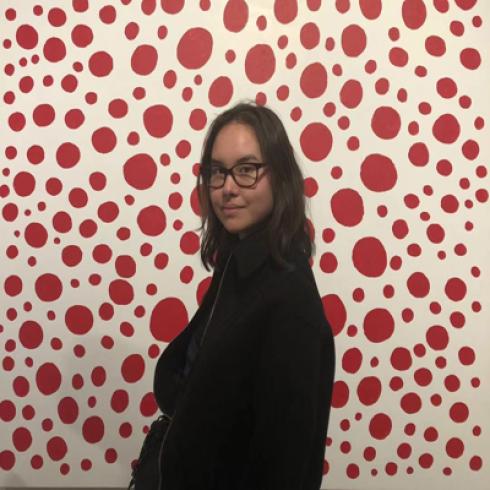Yesterday was a rainy day. The type of rainy day that condemns you to your bed because the stream of water coming from the sky was as if the Huangpu River’s source flowed from the heavens. Since I spent most of my day inside – avoiding doing homework, tirelessly waiting for my VPN to connect so I could watch “Avatar the Last Airbender” – I decided that the evening would be a pleasant, and relatively dry, time to go outside.
Shanghai at nighttime is a mystical place. The skyscrapers are seemingly infinite as the tops of them become concealed by clouds, and the streets are painted neon as the puddles reflect the sign of every shop down the alleyway. The musicality of the honking horns and occasional profanity of the anxious delivery driver is subdued by dusk and the evening light – people have retired to their homes after a long day in the always-bustling city. Even though Shanghai is one of the biggest cities in the world, there is an aura of calmness at night that I have not felt in any other city. In New York, the only time you can find a semblance of peace is perhaps the ungodly hours of the morning - 4 a.m. Syracuse, the seaside Sicilian town, on a summer night is alive with accordionists at every corner and lovers dancing the tarantella in the square. In Shanghai, however, starting around 10:30 p.m., life begins to quiet down significantly. For being the metropolis that Shanghai is, the subways end earlier than you might expect. I remember one night last semester, when my father came to visit me in Shanghai, we were heading back to my university and were just one stop away from where we needed to be. On the platform waiting for our transfer, the conductor tells us the trains have finished running their service for the night. We had just missed the last train – it was before 10 o’clock. Again in Beijing, the country’s capital, the heart of China, my friend and I had just pulled into the train station when we rushed to the subway. The taxis were booked for the night and we managed to make the last subway ride to our hotel – it was barely 11 p.m. It’s as though the cities have this self-imposed curfew, a subtle reminder of the rigidity of life in China.
But, the other evening, the night of my evening stroll, I gained a new perspective of Shanghai. I walked down Middle Huaihai Road – the epicenter of the former French Concession and one of Shanghai’s most luxurious neighborhoods – and felt this startling sense of unfamiliarity. Walking down the brightly lit department stores, passing the giant Cartier, Chloe, Hermes, and Tiffany & Co. stores, I did not feel as if I was in China. Every Chinese person you meet will be quick to say that Shanghai is not like China, rather it exists in its own bubble. Even though I walk past these stores every day, it is as though I have become desensitized to the skyscrapers looming above me and the symbols of decadence, of revisionism at every corner. I often think about Shanghai 100 years ago, what it would’ve looked like in its original state before the commercialization and its importance as a global financial center. There would be shikumen (lane houses) and communal homes of traditional architecture on every block, the tallest buildings would have been four or five stories tall. I was overcome with this fantasy of Shanghai’s past – the ghost of the city – amidst the modern and misty cityscape.
It was from this imagination that I was brought back to reality by an old woman sitting on the sidewalk. Crouched over a basket of flowers, she smiled at me. I had seen women like her before, often situated outside of subway stations or on busy streets where their hand-woven flower bracelets are likely to be sold. She had a basket of white flowers that she tediously and delicately weaves over metal wire. She leans in and holds a flower to my nose.
“是茉莉花,” she tells me.
It was a fragrance I instantly recognized, the fragrance of my favorite flower – jasmine. The scent brought over a wave of emotion. I felt like a kid again walking through Italy with my parents, a reminder of a fond childhood memory in a land that still feels sometimes so foreign. I eagerly bought two bracelets for 15 RMB. Yet, it was this image of the woman crouched in darkness, the sound of her soft voice that also brought me back to the reality of China. That reality is one composed of juxtaposition: The elderly woman selling bracelets for barely more than $2 to make a living is set against the beaming blue light of the three-story Apple store behind her. She is an image of trying hardships in one of the most rapidly developing economies in the world, her bracelet a souvenir of her hard work and a humbling reminder of China’s working class.
This small, and otherwise trivial, encounter turned out to be a resonant one. I walk home not only with the scent of jasmine still lingering in my nose, but also with the intensifying sense of alienation and frustration. Nighttime in Shanghai smells like jasmine and is aglow with neon skyscrapers, unfortunately it’s not enough to mask the reality of its societal inequality.

Micol Striuli
<p>I'm Micol and I'm a fourth year student at Providence College studying Political Science and East Asian Studies. I am fascinated with Chinese culture and politics, which has led me to come back for a second semester in Shanghai. My favorite things to do in Shanghai are going to art galleries, eating at one of the million cute dessert shops, going to karaoke, reading about Chinese Marxism, and waking up to a day with blue sky.</p>





